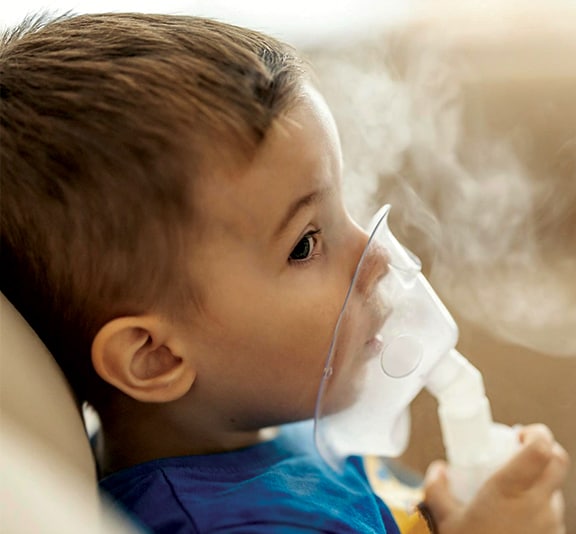

Our experts work closely with families to create a thorough asthma management plan that takes into account each child's particular needs. We not only aim at treating children but also at empowering parents with the right guidance, to ensure a better quality of life for their little ones. We strive to offer a comforting and child-friendly environment to make sure your little one is at ease throughout their journey with us.

Asthma is a chronic condition marked by inflammation in the lungs as a result of reaction to external factors and allergens.
Regular monitoring, proper treatment and taking necessary preventive measures can help to ensure that pediatric asthma does not negatively impact your childs life.
Pediatricians are key players in the management of childhood asthma, offering advice on drug use, dietary modifications, and emergency care.
Asthma can be broadly classified into 3 different types based on the underlying cause:
It is important to seek proper medical help for timely evaluation and treatment if your little one is experiencing any of the following symptoms related to asthma:
Numerous factors, including genetics, environmental variables and viral infections, might contribute to childhood asthma.
Asthma is more likely to occur in kids who have allergies, asthma, or eczema in their family. Asthma symptoms can also be brought on by exposure to pollutants, dust mites, pet dander, and pollen, as well as secondhand smoke.
Underlying respiratory illnesses like the flu and common cold are also known to trigger and aggravate the symptoms of an asthma attack.
Our expert Pediatricians employ a range of techniques to assess and diagnose children presenting with asthma symptoms. These include:
Our expert Pediatricians, at Surya Hospitals, collaborate with families to create an action plan for asthma that specifies what to do in the event that a child has asthma symptoms or an asthma attack. This strategy will outline how to take medications, when to seek emergency medical attention, and how to deal with triggers like allergens and pollutants.
Medication may be prescribed to treat and manage asthma symptoms. Families will be consulted to determine the best treatments and dosages for each child, as well as to keep an eye out for any potential adverse effects.
Our experts also offer information and counselling on how to manage a child's asthma, including lifestyle modifications like avoiding triggers, remaining active, and eating a balanced diet. Additionally, they might offer advice on how to correctly utilize inhalers and other drugs, as well as how to identify and handle asthma symptoms.
A combination of medication and lifestyle modifications is used for managing asthma symptoms in youngsters.
Although not all, but some children with asthma may need emergency care if their symptoms worsen and become unmanageable.
Yes, certain lifestyle modifications can help to manage asthma in some cases. You will be briefed about these by your child’s pediatrician based on their specific symptoms.
Yes, asthma can be genetic in some cases, i.e. it can be passed down from a parent to the child
Asthma is the most common chronic disease in kids affecting nearly 10 to 15 per cent of the total child population worldwide.
It is good to be curious when it comes to your health, but, it is equally important to put your curiosity to rest by seeking expert opinion. Have more questions related to your health?
Meet the compassionate souls behind our services. Our dedicated team of professionals is here to ensure you receive the best care, always

Meet the compassionate souls behind our services. Our dedicated team of professionals is here to ensure you receive the best care, always
Our commitment to world-class care is reflected in our numerous certifications, awards, and partnerships. Trust in our proven track record of excellence.
